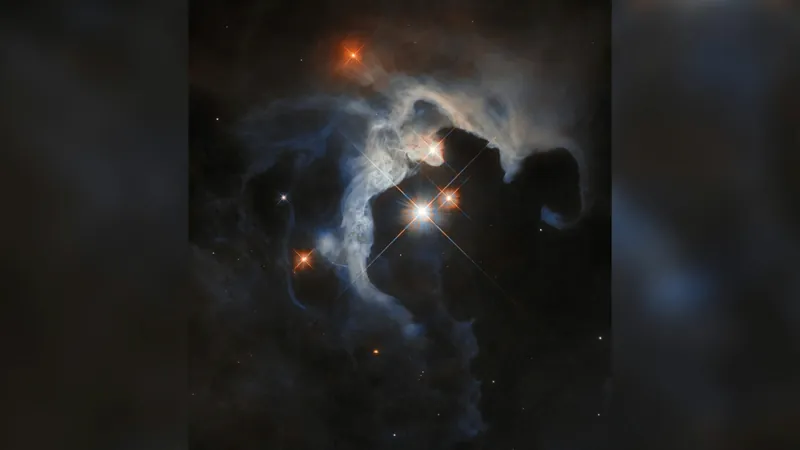
Unlocking the Secrets of the Universe: Black Holes as Cosmic Particle Accelerators
2025-06-06
Author: Olivia
The Cosmic Powerhouses: Black Holes' Hidden Potential
Black holes aren’t just voids in space; they are dynamic engines of energy. As they consume nearby matter, they not only grow in mass but also spin faster. This rapid rotation can lead to extraordinary outcomes, enabling collisions at energies high enough to potentially reveal the universe's most elusive particles, including dark matter.
How Black Holes Build Momentum
When matter approaches a black hole, it typically forms a rotating disk that feeds the beast. Over eons—approximately 10 million years—this feeding can crank a black hole's spin up to near its theoretical maximum. Interestingly, black holes can differ vastly in their rotation speeds: some spin lazily, while others, particularly those in the centers of galaxies, can achieve astonishing rates.
A Dance of Matter: Inside the Event Horizon
Not all black holes are constantly on the prowl for material. During dormant phases, when they have exhausted their surroundings, an influx of new gas could ignite a chaotic ballet. If this gas enters in a direction opposite to the spin of the black hole, the dynamics change dramatically. In this high-energy environment, infalling matter can collide with incoming particles, generating intense bursts of energy.
The Phenomenon: Bańados-Silk-West Effect
These interactions can result in collisions that release a staggering amount of energy—up to 100 times the mass of a single particle. Researchers have been exploring what’s known as the Bańados-Silk-West (BSW) effect, where such powerful collisions generate energies that rival or exceed those produced in human-made particle accelerators.
Nature’s Ultimate Particle Collider
A groundbreaking study by Dr. Andrew Mummery and Joseph Silk confirms that nature itself has created the most potent particle collider within our universe—at the core of galaxies. "We estimated how powerful these particle beams could be; they can generate energies equivalent to or exceeding those from Earth’s greatest colliders," Silk stated.
The Quest for Dark Matter
Dark matter, constituting about 85% of the universe’s mass, remains one of the biggest mysteries in physics. Despite extensive efforts using facilities like the Large Hadron Collider (LHC), researchers have yet to observe dark matter directly. The LHC, a 17-mile-long tunnel designed to accelerate protons, has already transformed our understanding of particle physics, yet developing a new collider could cost billions.
Silk and his colleagues argue that black holes might provide a natural shortcut in the quest to uncover dark matter. "While we invest in massive colliders, the secrets of supermassive black holes could shed light on what we’re looking for," he remarked.
The Future of Cosmic Discoveries
If particles created in black hole collisions reach Earth, they could contribute valuable insights. Observatories like IceCube in Antarctica and KM3NeT in the Mediterranean are already poised to detect high-energy particles, potentially unveiling evidence of new physics, including dark matter.
While the theory is captivating, the challenge lies in ensuring that the right kinds of particles collide in such a manner that creates detectable signals. Recent research emphasizes the significant potential of retrograde accretion—when material approaches a spinning black hole against its rotation. This process could result in collisions producing incredibly high-energy particles.
Exploring the Darkness to Illuminate the Universe's Secrets
Imagine this: the very entities that seem to consume light could actually be the key to revealing some of the universe's greatest mysteries. If researchers can confirm their models, future telescopes may detect particles ejected from these cosmic giants, carrying secrets from the very edge of spacetime into our grasp.
The darkest corners of the universe may very well illuminate our understanding of the cosmos, suggesting that black holes could cast light on the most profound questions of existence.









 Brasil (PT)
Brasil (PT)
 Canada (EN)
Canada (EN)
 Chile (ES)
Chile (ES)
 Česko (CS)
Česko (CS)
 대한민국 (KO)
대한민국 (KO)
 España (ES)
España (ES)
 France (FR)
France (FR)
 Hong Kong (EN)
Hong Kong (EN)
 Italia (IT)
Italia (IT)
 日本 (JA)
日本 (JA)
 Magyarország (HU)
Magyarország (HU)
 Norge (NO)
Norge (NO)
 Polska (PL)
Polska (PL)
 Schweiz (DE)
Schweiz (DE)
 Singapore (EN)
Singapore (EN)
 Sverige (SV)
Sverige (SV)
 Suomi (FI)
Suomi (FI)
 Türkiye (TR)
Türkiye (TR)
 الإمارات العربية المتحدة (AR)
الإمارات العربية المتحدة (AR)